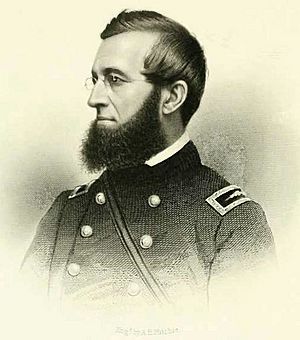Lewis Benedict facts for kids
Quick facts for kids
Lewis Benedict
|
|
|---|---|

Lewis Benedict
|
|
| Born | September 2, 1817 |
| Died | April 9, 1864 (aged 46) Pleasant Hill, Sabine Parish, Louisiana |
| Allegiance | Union |
| Service/ |
Union Army |
| Years of service | 1861-1864 |
| Rank | |
| Commands held | 162nd New York Volunteer Infantry |
| Battles/wars | American Civil War |
Lewis Benedict (born September 2, 1817 – died April 9, 1864) was an important person from New York State. He was a politician and a brave soldier during the American Civil War. He served as a Union colonel and was later honored with the rank of brevet brigadier general after he died in battle.
Contents
Early Life and Public Service
Before the American Civil War began, Lewis Benedict was involved in politics. He worked as a city attorney in Albany. He also served as an Assemblyman for New York State. This meant he was a representative in the state's government. He completed his studies at Williams College in 1837.
Serving in the Civil War
When the Civil War started, Benedict chose to serve his country. He became a colonel in the Union Army. He led a group of soldiers known as the 162nd New York Volunteer Infantry. This group was formed in New York City.
Captured by the Enemy
During the war, Colonel Benedict faced many dangers. He was captured by Confederate forces at Williamsburg, Virginia. He spent several months as a prisoner. He was held in different Confederate prisons.
Major Battles and Sacrifice
After his release, Benedict continued to fight. In 1863, he took part in the Siege of Port Hudson. This was a long and difficult battle. It took place in Louisiana.
Sadly, Colonel Benedict was killed in action in April 1864. This happened during the Battle of Pleasant Hill in Louisiana. He bravely led his troops until the very end.
Posthumous Honor
After his death, Lewis Benedict was recognized for his bravery. On March 13, 1865, he was given a special honor. He was posthumously (after his death) promoted to brevet brigadier general. This award was for his "gallant conduct" at Port Hudson. It showed how brave and skilled he was as a leader.

